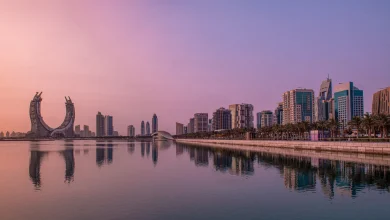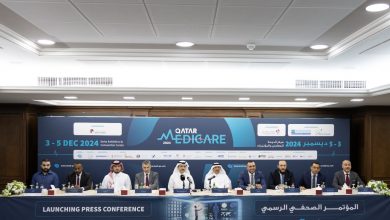
Qatar ranks 5th globally in health
قطر الخامسة عالمياً بقائمة أفضل النظم الصحية
QNA
Doha: Improved life expectancy, better health outcomes, and investment in health infrastructure have led to Qatar being ranked 5th in the world for health by the Legatum Institute, a London-based think tank.
In compiling the health ranking in the annual prosperity index, countries’ performance in three areas, including basic health outcomes, health infrastructure, and preventative care, and physical and mental health were evaluated.
The rise in the rankings from 13th place last year has been driven by the fact that Qatar has the highest life expectancy rate in the Eastern Mediterranean Region and globally ranks in the top 25 percentile for healthcare access and quality. The country’s healthcare spending is among the highest in the Middle East, with QR 22.7 billion invested in healthcare in 2018, a 4 percent increase from the previous year.
Qatar is the only country in the region to score in the top five on the annual prosperity index, placing behind Singapore, Luxembourg, Japan, and Switzerland.
Minister of Public Health H E Dr Hanan Mohamed Al Kuwari said under the wise leadership of the Amir H H Sheikh Tamim Bin Hamad Al Thani, Qatar has invested heavily in the health sector. She said the top placement in the international index is a reflection of the country’s commitment to system-wide priorities designed to both meet the needs of future generations and improve the health of the current population.
“The 2018 ranking recognizes the investment the country has made in health infrastructure. Over the past two years, we have opened six new public sector hospitals and more than 1,100 new hospital beds. We have also opened four new Health and Wellness Centres. The ranking also recognises that our focus on areas such as cancer, diabetes, and smoking cessation are having a positive impact on people’s lives, and ultimately it recognizes that life expectancy in Qatar continues to improve,” Dr Al Kuwari said.
Since 2017 Hamad Medical Corporation (HMC) has opened four new hospitals – Hazm Mebaireek General Hospital, Women’s Wellness, and Research Center, the Qatar Rehabilitation Institute, and the Ambulatory Care Center – significantly expanding its infrastructure and the range of services offered to patients. In the past eighteen months, Sidra Medicine, Naufar, and four new Primary Health Care Corporation (PHCC) Health and Wellness Centers and one new Health Center have opened. Additionally, a number of new private sector hospitals and diagnostic and treatment centers have begun caring for patients and additional healthcare facilities are set to open this year.
The Minister said that the opening of the new facilities, along with the expansion of existing services, is part of the long-term plan set out in the National Health Strategy 2018-2022. She said a focus on preventative care and integrated services across the whole health sector is helping ensure that when people need care, they are able to access it in a timely way.
“We’ve made real and substantial changes to the way the health system works, moving from focusing on treating the symptoms of a disease to helping people stay healthy. The establishment of new facilities and services like HMC’s Tobacco Control Center, the National Obesity Treatment Center, and PHCC’s Lifestyle Clinics, and the implementation of tools like the electronic patient health record across the public health system and the introduction of the MyHealth Patient Portal, are helping to empower patients to share the responsibility for their health,” added Dr Al Kuwari.
The Minister noted that Qatar’s health system is continually measuring itself against the very highest international standards. “It is a mark of how far Qatar’s healthcare system has progressed in recent years that it now not only meets but exceeds many international benchmarks for quality of care. For example, the international benchmark for the time that elapses from when a heart attack patient arrives at the hospital to the time the blocked artery is opened is 90 minutes, while at Heart Hospital, it is around 60 minutes. And at HMC 68 percent of stroke patients are treated with acute intervention within 60 minutes of arrival, above the international benchmark of 50 to 60 percent. We have also worked hard to focus our efforts on infection control and have an incidence per 10,000 patient days of hospital-acquired MRSA of just 0.2, well below 0.6 in the US and 5.5 in Switzerland.”
Qatar also ranks strongly for a number of health outcomes. The nation has the highest life expectancy rate in the Eastern Mediterranean Region and has seen the crude death rate per 100,000 population decline throughout this decade, from 99.1 in 2014 to 80.2 in 2017. Additionally, infant mortality rates have declined consistently in recent years, from 7.4 per 1,000 live births in 2015 to 5.4 per 1,000 live births in 2017.
The health ranking in the annual prosperity index uses data from the World Health Organization (WHO), World Bank Development Indicators, the Gallup World Poll, and a variety of other sources to measure and rank the health of people living in 149 countries.
حلّت دولة قطر في المرتبة الخامسة عالمياً على مؤشر الصحة الذي يصدره معهد «ليجاتوم»، ومركزه الرئيسي في لندن، وذلك بفضل تحسين متوسط العمر المتوقع، والنتائج الصحية للمرضى، وارتفاع نسبة الاستثمار على مستوى البنى التحتية الصحية.
ويرتبط هذا التقدم الذي شهدته دولة قطر من المرتبة الـ 13 إلى المرتبة الخامسة، بكونها تحتل المرتبة الأولى في منطقة الشرق الأوسط على صعيد متوسط العمر المتوقع، وضمن قائمة الخمسة والعشرين الأفضل عالمياً من حيث جودة الخدمات الصحية وسهولة الوصول إلى الرعاية الصحية. هذا ويعدّ معدل إنفاق الدولة في قطاع الرعاية الصحية من أعلى المعدلات في منطقة الشرق الأوسط، بحيث تم استثمار 22،7 مليار ريال في مجال الرعاية الصحية خلال عام 2018، مع ارتفاع بنسبة 4 % عن السنة السابقة.
وتجدر الإشارة إلى أن قطر هي الدولة الوحيدة في المنطقة التي تمكّنت من ضمان مركز لها ضمن المراتب الخمس الأولى على مؤشر الرخاء السنوي، الذي تصدرته سنغافورة، تليها لوكسمبورغ، واليابان، وسويسرا.
في ظل القيادة الحكيمة لصاحب السمو
د. حنان الكواري: استثمارات ضخمة بالقطاع الصحي
أكدت سعادة الدكتورة حنان محمد الكواري وزيرة الصحة العامة، أن دولة قطر وظّفت استثمارات ضخمة في القطاع الصحي، في ظل القيادة الحكيمة لحضرة صاحب السمو الشيخ تميم بن حمد آل ثاني أمير البلاد المفدى. كما أكدت أن احتلال المراتب الأولى على المؤشر الدولي إنما يعكس التزام الدولة بالأولويات على نطاق منظومة الصحة، والمصممة خصيصاً لتلبية احتياجات الأجيال القادمة وتحسين صحة السكان حالياً. واستطردت سعادة الدكتورة حنان الكواري قائلة: «يشكل التقدم في الترتيب لعام 2018 خير دليل على ما وضعته الدولة من استثمارات في البنى التحتية الصحية. فخلال السنتين الأخيرتين، افتتحنا 6 مستشفيات جديدة تابعة للقطاع العام، ساهمت في توفير أكثر من 1100 سرير جديد، كما افتتحنا 4 مراكز جديدة للصحة والمعافاة.
ويعدّ أيضاً الترتيب مؤشراً على أن تركيزنا على عدد من الأمراض، بما فيها السرطان والسكري والإقلاع عن التدخين، قد ترك أثراً إيجابياً على حياة الأشخاص، وسيؤدي في نهاية المطاف إلى مواصلة تحسين متوسط العمر المتوقع في قطر».
تغييرات فعلية وجوهرية في آلية العمل
قالت سعادة الدكتورة حنان الكواري: «لقد أحدثنا تغييرات فعلية وجوهرية في آلية عمل النظام الصحي، بحيث انتقلنا من التركيز على علاج الأعراض المرضية إلى مساعدة الناس على الحفاظ على صحتهم.
فإنشاء مرافق وخدمات جديدة، كمركز مكافحة التبغ، والمركز الوطني لعلاج السمنة، وعيادات نمط الحياة الصحي التابعة لمؤسسة الرعاية الصحية الأولية، وتطبيق باقة من الأدوات منها السجلات الصحية الإلكترونية في مختلف مرافق النظام الصحي وبوابة «صحتي» الإلكترونية الخاصة بالمرضى؛ تُسهم جميعها في تمكين المريض من المشاركة في مسؤولية الحفاظ على صحته». ولفتت سعادتها إلى أن النظام الصحي في قطر يحرص دوماً على تقييم أدائه وفقاً لأرقى المعايير المتعارف عليها عالمياً؛ حيث قالت: «يعكس هذا الإنجاز التقدم الذي أحرزه نظام الرعاية الصحية بقطر خلال السنوات الأخيرة، الذي لا يمتثل فحسب للمعايير الدولية العديدة في مجال الرعاية ذات الجودة العالية، بل يتجاوزها أيضاً».



